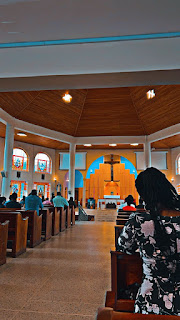THE MERCY OF GOD IS BOUNDLESS
Fr. Ugochukwu Ugwoke, ISch
Scripture Readings: Acts 4:32-35; 1 John 5:1-6; John 20:19-31
Today, Second of Easter is the Divine Mercy Sunday. The Divine Mercy Sunday was instituted by Pope John Paul II in 2000, when he canonized Saint Faustina, a Polish nun, and declared the Second Sunday of Easter as Divine Mercy Sunday. This declaration was made in response to Saint Faustina’s visions and the messages of divine mercy that she received from Jesus. The Divine Mercy Sunday is a day dedicated to reflecting on and receiving God’s abundant mercy, as revealed through Jesus Christ. It also emphasizes the importance of trusting in God’s mercy and seeking his forgiveness.
Mercy is one of the most profound attributes of God. It encompasses God’s willingness to pardon and show kindness to those who have sinned or fallen short of his standards. In the Bible, mercy is frequently mentioned as a central aspect of God’s character, demonstrated through his acts of forgiveness, redemption, and salvation. God’s mercy is boundless and unending, extending to all people regardless of their sins or shortcomings. It is a reflection of God’s immense love for humanity and his desire for reconciliation with his creation. Through his mercy, God offers forgiveness to those who repent and turn to him, welcoming them back into his loving embrace.
Today’s celebration reminds us that no matter how great our sins may be, they can never outweigh or exhaust the infinite mercy of God. In his boundless mercy, God reaches out to us with open arms, ready to forgive and embrace us, no matter how far we have strayed or how deeply we have fallen. His mercy knows no limits, extending to every corner of creation and to every person, regardless of their past mistakes or failures. There is no sin too great for God’s forgiveness, no heart too broken for his healing touch.
The ultimate expression of God’s mercy is seen in the sacrificial death of Jesus Christ on the cross. Through his atoning sacrifice, Jesus bore the weight of humanity’s sins, offering redemption and salvation to all who believe in him. His resurrection from the dead symbolizes the triumph of mercy over sin and death, of light over darkness, of hope over despair, and of belief over doubt, providing hope and new life to all who seek him.
In today’s Gospel, we encounter the risen Christ appearing to his disciples in the upper room. He greeted them with the words, “Peace be with you,” and showed them his wounds as a sign of his victory over sin and death. Jesus then breathed the Holy Spirit upon them, empowering them to forgive sins and to be ministers of reconciliation. The story of Thomas, who initially doubted the resurrection until he encountered Jesus personally and saw his wounds, serves as a powerful reminder of the transformative power of encountering Christ’s mercy. Thomas’s doubt was transformed into faith when he exclaimed, “My Lord and my God!” This encounter teaches us that Jesus meets us in our doubts and fears, inviting us to experience his mercy and believe in his resurrection.
As we celebrate Divine Mercy Sunday, let us reflect on the ways we can embrace God’s mercy in our lives. As recipients of God’s mercy, we are called to reflect his compassion and forgiveness in our own lives. This means showing kindness and compassion to others, extending forgiveness to those who wrong us, and seeking reconciliation with our fellow human beings. By embodying God’s mercy in our actions and attitudes, we participate in his work of redemption and bring healing and restoration to a broken world. May we be ambassadors of God’s mercy in a world in need of healing and reconciliation. Amen.



Comments
Post a Comment